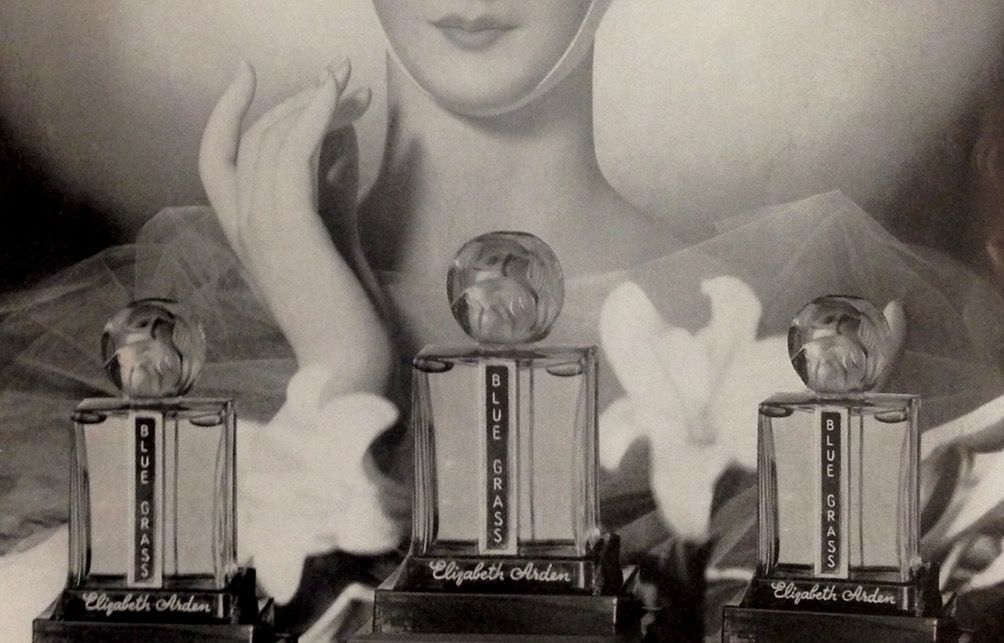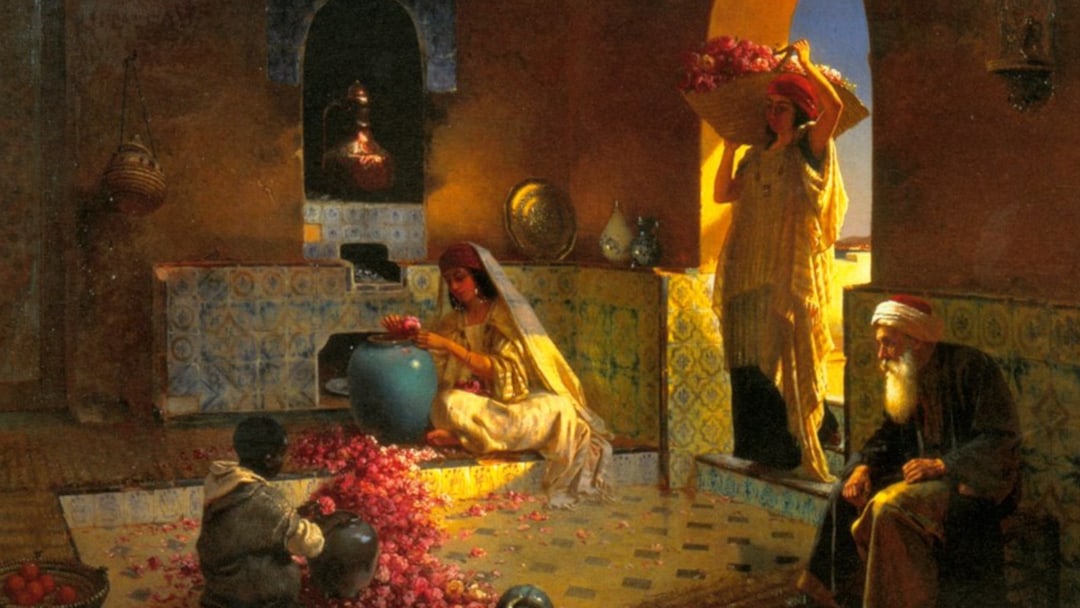No one person is singled out as the first creator of perfume nor is there a civilization we can pinpoint as the first to begin wearing perfume. However, the earliest record we have of the first chemist/perfumer would be Tapputi, who lived in Babylonian Mesopotamia in around 1200BC. The cuneiform tablet discovered during the excavation revealed her process using distillation techniques to blend flowers, oils, and resins.
Perfume then was primarily used in rituals and rites, some with the intention of cleansing, others as offerings to the Gods. It was wildly different from what we consider perfume today, as it was very incense-heavy, making use of a lot of frankincense and myrrh. This is also where the word perfume comes from, which is Per Fumum meaning "by means of smoke" or "through smoke" in Latin.
While Tapputi is the first known recorded perfumer, the oldest perfume we know of was discovered in Cyprus during the Bronze age through observing the residual fragrances in terracotta jars. The mixtures in said jars contained extracts of herbs, flowers, spices, oils, and other essences to create the perfumes. Supposedly, the area was assumed to have been used as a perfumery, manufacturing on an industrial scale, and was carefully preserved after an earthquake blanketed the area in dirt and debris.
 It's quite interesting reading about how perfume developed through time. The Egyptians for example invented glass bottles and apparently holding perfume became its most common use at the time. The ancient Greeks made use of fragrant powdered perfume on their beddings so it'd stick to their skin when they slept in it and they believed in different ingredients serving different purposes such as megaleion for healing or Iris for... laxative purposes. In ancient China, perfume wasn't limited to application on the body, but was very mainstream and used in everyday items like ink and stationery, as well as home scents to purify their environment. From Persia we have chemist Ibn Sina, who discovered and popularized the use of distillation and extraction of oil from flowers, a process still being used today.
It's quite interesting reading about how perfume developed through time. The Egyptians for example invented glass bottles and apparently holding perfume became its most common use at the time. The ancient Greeks made use of fragrant powdered perfume on their beddings so it'd stick to their skin when they slept in it and they believed in different ingredients serving different purposes such as megaleion for healing or Iris for... laxative purposes. In ancient China, perfume wasn't limited to application on the body, but was very mainstream and used in everyday items like ink and stationery, as well as home scents to purify their environment. From Persia we have chemist Ibn Sina, who discovered and popularized the use of distillation and extraction of oil from flowers, a process still being used today.
Over time, it has expanded to express emotion, sensuality, and even luxury. Other uses varied from being used for hygiene and sensitivities to foul odors, most especially for the doctors fighting the plague and other epidemics in the Middle Ages. Queen Elizabeth I even ordered areas around town to be scented because she was particularly sensitive to offensive odors. This royal order was nothing compared to what King Louis XIV insisted upon during his reign due to his dislike of bathing, thus producing the most fragrant era of Versailles.
 Flower petal-filled bowls were scattered around the palace, fans and furniture were sprayed with perfume, even the fountain water was not left untouched. He was excessive, even commissioning perfumers to create a different fragrance dedicated to each day of the week and requested his clothes simmer in perfume spritzed on the night before. Supposedly, he and his mother even wore a very gourmand chocolate fragrance when he was younger (cool AHHAHAHA).
Flower petal-filled bowls were scattered around the palace, fans and furniture were sprayed with perfume, even the fountain water was not left untouched. He was excessive, even commissioning perfumers to create a different fragrance dedicated to each day of the week and requested his clothes simmer in perfume spritzed on the night before. Supposedly, he and his mother even wore a very gourmand chocolate fragrance when he was younger (cool AHHAHAHA).
In the early 1300s, Queen Elizabeth of Hungary commissioned a blend of rosemary, thyme, orange blossom, and lemon) and this perfume, dubbed "Hungary Water", is known as one of the first example of modern perfume and due to it's alcohol base, is also the first Eau de Toilette. In the 18th century, we witness the birth of Cologne after Giovanni Paolo Feminis creates an even lighter, fresher alcohol-based fragrance consisting of citrus, lavender, and neroli and sells this new concoction of his, named Aqua Mirabilis. His nephew, Giovanni Maria Farina, continued with the production of this fragrance, modernizing and popularizing cologne with great success.
The 19th century on the other hand witnessed the birth of one of the first examples of modern perfume through the creation of Paul Parquet's Fougere Royale or Guerlain's Jicky, which made use of vanillin, as well as Coty popularizing absolutes in his perfume making process. Later on, the iconic Chanel No. 5 would debut, which used aliphatic aldehydes to mimic a rich jasmine scent. Given the unsustainability of sourcing certain ingredients to create the perfume notes, thus began the more popularized options of formulating synthetic compounds as more reliable and cheaper replacements. This also meant as time went on, the scents were become lighter, fresher, and brighter now that many perfumers had more flexibility with aldehydes, among others.


 It's quite interesting reading about how perfume developed through time. The Egyptians for example invented glass bottles and apparently holding perfume became its most common use at the time. The ancient Greeks made use of fragrant powdered perfume on their beddings so it'd stick to their skin when they slept in it and they believed in different ingredients serving different purposes such as megaleion for healing or Iris for... laxative purposes. In ancient China, perfume wasn't limited to application on the body, but was very mainstream and used in everyday items like ink and stationery, as well as home scents to purify their environment. From Persia we have chemist Ibn Sina, who discovered and popularized the use of distillation and extraction of oil from flowers, a process still being used today.
It's quite interesting reading about how perfume developed through time. The Egyptians for example invented glass bottles and apparently holding perfume became its most common use at the time. The ancient Greeks made use of fragrant powdered perfume on their beddings so it'd stick to their skin when they slept in it and they believed in different ingredients serving different purposes such as megaleion for healing or Iris for... laxative purposes. In ancient China, perfume wasn't limited to application on the body, but was very mainstream and used in everyday items like ink and stationery, as well as home scents to purify their environment. From Persia we have chemist Ibn Sina, who discovered and popularized the use of distillation and extraction of oil from flowers, a process still being used today.
 Flower petal-filled bowls were scattered around the palace, fans and furniture were sprayed with perfume, even the fountain water was not left untouched. He was excessive, even commissioning perfumers to create a different fragrance dedicated to each day of the week and requested his clothes simmer in perfume spritzed on the night before. Supposedly, he and his mother even wore a very gourmand chocolate fragrance when he was younger (cool AHHAHAHA).
Flower petal-filled bowls were scattered around the palace, fans and furniture were sprayed with perfume, even the fountain water was not left untouched. He was excessive, even commissioning perfumers to create a different fragrance dedicated to each day of the week and requested his clothes simmer in perfume spritzed on the night before. Supposedly, he and his mother even wore a very gourmand chocolate fragrance when he was younger (cool AHHAHAHA).